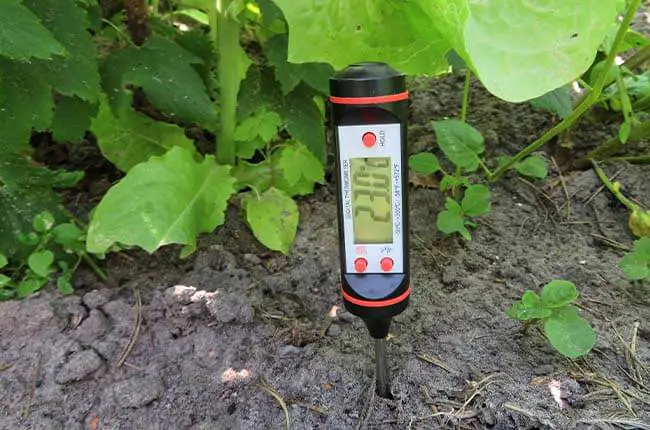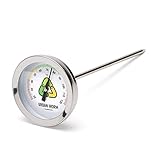Your body thermometer and food thermometer may be at your fingertips. But can you just stick any thermometer in your garden to check the soil temperature? What are their differences?
Food thermometers can be used to check soil temperature but they are not ideal because of their short (4 inches or 10 cm) and thin probe. Compost thermometers, featuring long (18 inches or 45 cm) and thick probes and analogy temperature readings, are the best tool for measuring the soil temperature at a depth of where plant roots are.
In this article, I will look at whether food thermometers can be used as soil thermometers with respect to the length of the probe, the range of temperature they can detect, their resistance to damage, etc. A comparison will also be made with compost thermometers.
Best soil thermometers
EDITOR'S PICK "REOTEMP" Soil/Compost Thermometer | 16 inch (41 cm) probe length 1/4 inch probe diameter Can detect 0 to 200°F (-18 to 93°C ) Hermetically sealed to prevent fogging Can be left outside overnight Durable, stainless steel |
Worm Compost Thermometer | Short-probe: 5 inch (13 cm) Stainless steel Can detect 32 to 140°F (0 to 60°C) |
Extra long probe "General Tools" Extra-long probe Compost/Soil Thermometer | 36 inch (91.4 cm) probe length 1/4 inch probe diameter Can detect 0 to 220°F (-18 to 104°C) Stainless steel |
1. Can a food thermometer be used for soil?
The design of food thermometers is not suitable for measuring soil temperature.
The majority of food thermometer models available can measure a wide range of temperatures, from -58°F to +572°F (-50°C to +300°C). They are designed for measuring the temperature inside of a big chunk of cooked meat, such as a whole chicken, turkey, lamb, and also milk, coffee, and water bath. They are also used for making fermented food, candies, bread, cake, and chocolate where the temperature is important. But for measuring soil temperature, such a feature is overkill because the soil cannot get that hot.

Food thermometer, featuring an ultra-thin foldable probe
Also, the probe that is inserted into the food is generally around 4 to 5 inches (10 to 13 cm) long, which is too short for inserting it deep into the soil to check the temperature around where the roots are especially for tall plants and trees.
The stainless steel probe usually has an ultra-thin diameter of only 1/8 inch (3.2mm). That is designed to not leave any poking marks in the meat but can easily bend or get damaged when it is inserted into rocky and hard ground.
With a digital display on batteries, food thermometers are not meant to be left in the soil for an extended period of time.
However, you can still use a food thermometer as a soil thermometer if you dig away a few inches of the topsoil so that the food thermometer with a short probe can check where the root zone of the plants would be. This can only be done if you have not planted anything yet in the ground.
2. Can a compost thermometer be used for soil?
Thermometers that are designed to measure the temperature of compost piles are generally designed to measure soil temperature as well.
Depending on the model, the special feature of compost/soil thermometers is that they have long probes of 18 inches (45 cm) long and even up to 36 inches (91 cm), for inserting deep into a compost pile as well as the ground for checking the temperature near where the plant roots are. Compost thermometers with a shorter 5-inch long probe can be used to measure worm compost.
The probe has 1.5 inches (3.8 cm) in diameter, which is thick and resistant to breaking or getting bent when inserting them into hard and rough terrain.
They can detect a range of soil temperature from 0 to 200 °F (-18 to 93 °C).
Their water-proof analog dial also allows them to be left outside in the ground or a compost pile for several days up to weeks without any problem.
Here is a comparison of a popular model of compost thermometer versus a food thermometer.
| Compost thermometer | Food thermometer | |
| Temperature range | 0 to 200 °F (-18 to 93 °C) | -58°F to 572°F (-50°C to 300°C) |
| Probe length | 16 inch (41 cm) | 4-5 inch (10-13 cm) |
| Probe diameter | ¼ inch (6.4 mm) | 1/8 inch (3.2mm) |
| Water resistance | yes | yes |
| Temp display | Analogy, no battery | Digital (use battery) |
3. Can any thermometer be used for soil and compost?
Not any thermometer is suitable for measuring soil temperature.
Thermometers that measure body temperature are definitely not suitable because they are designed to measure a narrow range of body temperature, which is very different from the possible range of soil temperature.
Other factors that need to be considered include the length of the probe, the durability of the probe to insert into hard soil, and also its durability for being left outside on the ground for a long period of time.
A soil or compost thermometer costs around $15. It will prove to be one of the best tools for any serious gardener.
4. Do I need a thermometer to compost?
Having a compost thermometer is crucial for composting because the temperature is key to the success of maturing compost as microbes require to be at a certain range of temperature to finish the decomposition process.
Another reason why it requires a compost thermometer in particular, and not any thermometer because it is designed to be resistant enough to be left in the compost pile for days or even weeks to monitor the change of temperature during decomposition.
The decomposition process can go from 85-120°F (30 to 50°C) during the Mesophilic phase to the highs of 120-158°F (50-70°C) during the Thermophilic phase before it cools off during the curing phase. Your body thermometer and food thermometer certainly do not have a probe long enough to check the temperature at the core of a compost pile.
If the temperature of your compost pile is too low and has not reached a temperature within the range of 120-158°F (50-70°C), you will need to turn the compost or add more green organic materials (e.g. kitchen waste, green leaves, bloodmeal) to accelerate the decomposition process.
On the other hand, if the temperature goes above 158°F (70°C), that means that the bacteria are likely to die and the decomposition process will soon finish.
Conclusion
In a nutshell, it is best to use compost thermometers to measure soil temperature because of the long, thick and durable probe. Besides, they are built to be resistant enough to be left in the ground or your compost for weeks to monitor the change of temperature during the whole decomposition process.
Food thermometers can be used as a temporary solution and only if you remove a few inches of the topsoil before you poke the thermometer into the ground.
Happy gardening!
Related
7 Ways to Increase Soil Temperature (Effectively)
Top 10 Moisture Meters For Houseplants & Garden
References
Pathak, T. B., Hubbard, K. G. & Shulski, M. (2012). Soil temperature: A guide for planting agronomic and horticulture crops in Nebraska. University of Nebraska: Lincoln, NE, USA.
Solana Center for Environmental Innovation. (2009). “Rotline” Question of the Week: Do I need a thermometer to compost?
- Keiki Paste vs Rooting Hormone:What’s the difference? - February 4, 2024
- Top 10 Orchid Fertilizers: A Comprehensive Review (2024) - February 2, 2024
- Top 8 Soil Inoculants For Stronger Plants (2024) - February 1, 2024





